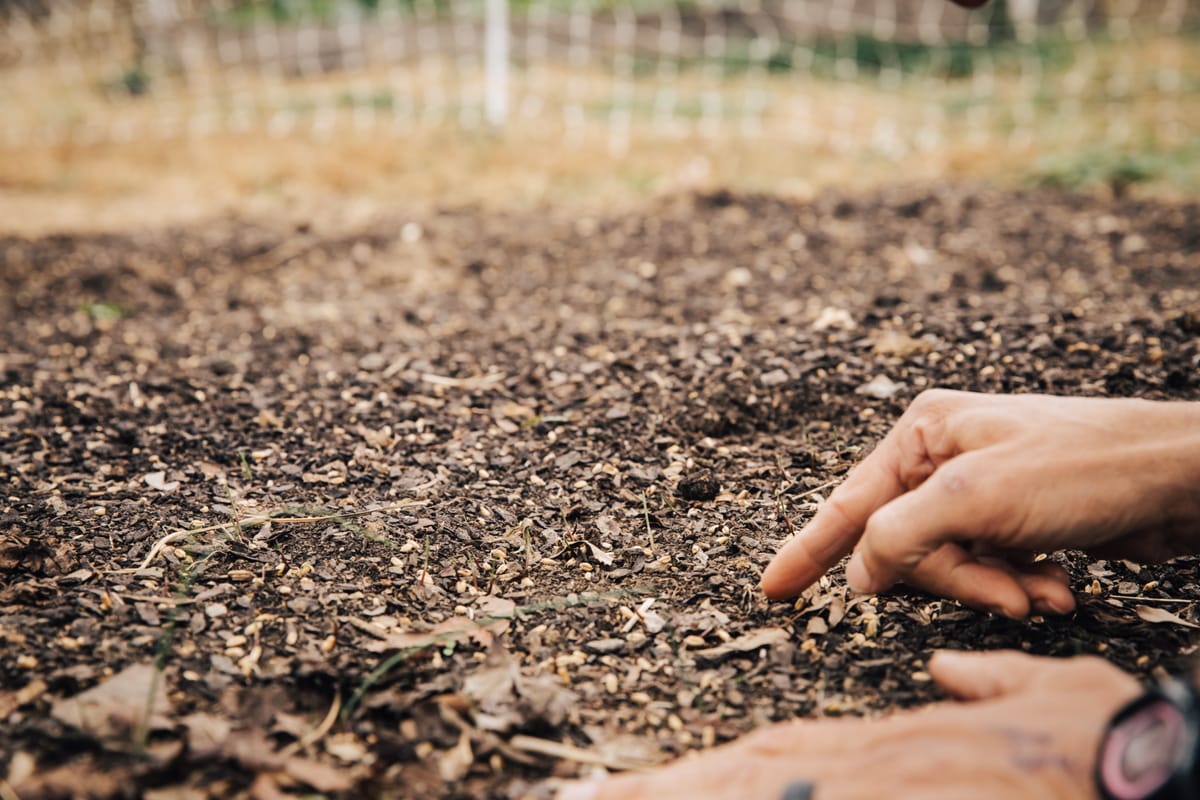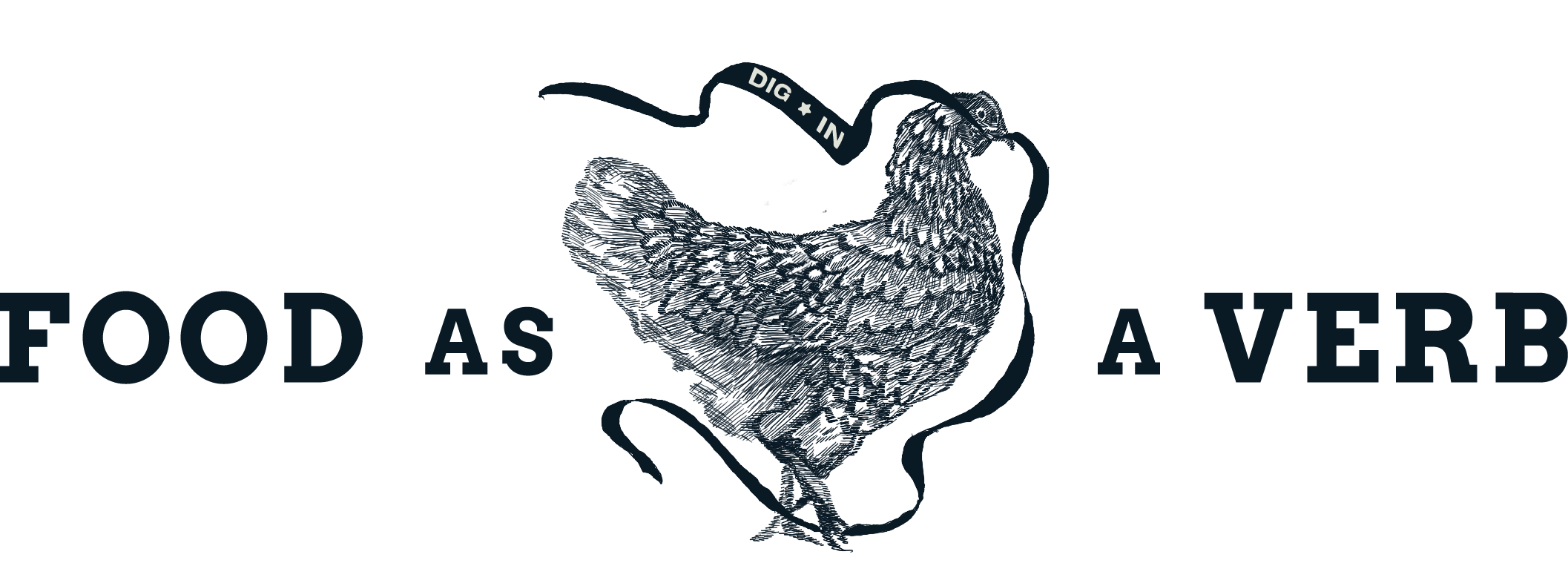Ashes to ashes: can seeds teach us about living and dying?
A story of spinach, wheat, corn and roses. (And one hell of a good dog.)

What part of us is perennial?
For me, it's all about freedom. If you ask why I garden or (try to) farm, I may dance around for a while, trying my best to sound like Wendell Berry or something, but sooner or later, we'd get to my most genuine answer.
Freedom.
I feel free when I work the land.
Free to inhabit my body differently. Free to participate in one of humanity's oldest endeavors. Free to relearn and remember so many things I have forgotten.
Free to grow my own food. Free to reject total dependence on corporations, grocery store shelves and my credit card.
Why depend on others if I can do it myself?
So, a few years ago, I began saving seeds. Nothing serious, some spinach, sunflowers, pumpkins and so forth. I dry the seeds on paper towels then store them in a plastic bag tucked in a brown paper bag just an arm's reach away from my writing desk. It's a tiny way I feel independent, honest and free.
For three seasons, I've grown pumpkins all originating from seeds saved from one 2020 Fazio pumpkin, given to me by my best mate and farming partner. There's a sense of connection and low-level thrill at my ability to continue this pumpkin, season after season.
Chelsea Askew, who farms in north Georgia, understands that connection, too. She's been growing corn from seed that dates back generations.
"I experienced a profound connection to my great-grandfather while hoeing the corn I was growing on land he once tended, from seed saved by him for decades," she said.
Chelsea grew up in Peavine, Georgia, near Rock Spring, where today she's the fourth-generation farming on land and planting the same Thompson's Prolific White Dent Corn as her great-grandfather.
"I never met my great-grandfather, Dewey DeWitt Pierce, seeing as he died before I was born, but I sure felt something deep and profound running through my veins in that hot Georgia sun knowing he had done the same, and that now I was attempting to continue to select for the best seed nearly 50 years after him," she said.
What a beautiful description.
Chelsea sells seeds to Truelove Seeds. If you're planning your summer plot, you can buy her candy roaster squash seeds, Georgia rattlesnake watermelon, whippoorwill southern pea and, yes, Thompson's Prolific.
"Even while living in other states, many hours away," she said, "I still made a point to have at least a small plot growing in an attempt to keep the seed and the connection alive."
Keep the seed and connection alive ...
Working the land restores this connection in ways few other parts of modern life can. The very materials and methods present within farming are each wise teachers, each seed containing tiny scripted messages for us on life and how to receive it.
Like this:
Last week, I planted seven rows of spinach. This tiny seed – no bigger than the letters in this word – will become 100 times its size within several weeks.

Is that not an act of faith? Sowing seeds aligns us with what is yet to come. I'm not planting seeds so much as the promise of spinach. Planting is both present-and-future-tense work.
I spent years studying theology, but words on a page can only go so far; when planting, all this talk of transformation becomes real.
Last year, we wrote about Erik Zilen's attempt to grow, harvest and mill local grain in order to bake local Niedlov's bread.
Part of that work involved Dr. Robin Fazio and Baylor School students, who, at their beautiful campus garden, planted a test run of Appalachian White winter wheat back in the fall.

Within days, those wheat seeds germinated.

And began to poke little green shoots through the soil.

Now, months later, the field is covered in early green wheat.

This is the joy of planting. It is an intentional participation with the side of life that never stops turning.
Yet this only happens through death and decay.
The seed becomes the plant.
The plant decays.
Within the decay, seeds are produced.
And back again.
"Unless a grain of wheat falls into the earth and dies, it remains alone. But if it dies, it bears much fruit," Christ declared.
The seed is only made possible through death.
One day, the tiny spinach seed I planted will grow into robust spinach plant, which will, in turn, bolt, decay and die.
In its dying, it will produce seeds.
Hundreds of them.
And those seeds – saved and resown – will grow into spinach.
So, where does the spinach begin?
Where does it end?
Think of Askew's great-grandfather's corn. Is she not planting some aspect of that very same corn her great-grandfather grew?
Where did his corn end? Has it?
At some point, we shift the questions to ourselves.
Where do you and I begin and end?
What part of us is perennial?
I'm in the third quarter of life. My body has begun it slow decay. One day, it will die.
Is there any part of me that lives on?
What part of me must fall to the ground, as Christ suggests?
And what remains?

Food as a Verb thanks Tucker Build, our sustaining partner, for its generous support.
Tucker Build offers Chattanooga a commercial construction firm made up of design-build experts specializing in the planning, building and managing process.
Maybe a story will help.
Eight years ago, we adopted our second dog from the Humane Society. The color of a Marlboro filter, he was lying unpretentiously, unceremoniously in the dirt when we found him, as if we, not this orphaned dog, were the fortunate ones in this encounter.
It was late summer. Our kids were reading Wonder. We named him August. Brought him home and within days, it was clear: this is a strange dog.
He'd howl at sirens. Hated storms. Hated bridges. Hated squirrels. His favorite snack? His own poop. Oddly fascinated with licking his own bum, he was wildly crude and mannerless.
And damn, we fell hard for each other.
He was fiery loyal, a welterweight champ in the neighborhood. There was never any hesitation into bravery – the no-pause courage you see in firefighters that rush into burning buildings, this dog had it in spades. He bit at squirrels, copperheads bit at him, and was always – I mean always – high-frequency-tuned into me. It was a tender tuning; oh, how he cuddled.
He became a shadow dog. My shadow dog. Wherever I went, he was sure to follow.

I won't turn maudlin, so let me say it straight: he died in September. Sick on a Friday, dead by Saturday evening. Tumors, the vet said. All over his stomach like flies.
I watched August – my shadow dog, this always-nearby friend – take his last breath. As I did, I heard myself crying out loud: God, please take this dog.
For weeks, I stumbled around, dazed and so confused. I kept muttering: where did he go? He was just here. And now, where is he?
Like all encounters with death, it is sobering. For all my highfalutin agrarian talk on seeds and rebirth, I must admit the real truth: so much of me doesn't want the grain of wheat to fall to the damn ground and die.
I want life, but not loss.
I love the seeds, not the decay.

Writing that sentence, I am quickly aware how limited and culturally shaped my views are. Had I been born, say, in a 15th century rainforest, would I fear death and decay in such ways?
"For almost all oral cultures, the enveloping and sensuous earth remains the dwelling place of both the living and the dead," writes David Abram in The Ecology of Magic.
Abram describes the ways some cultures burn the body, returning it to the "swirling air." Others dismember the body, intentionally leaving pieces behind so they will be eaten by wolves or condors.
"Death, in tribal cultures, initiates a metamorphosis wherein the person's presence does not 'vanish' from the sensible world (where would it go?) but rather remains as an animating force within the vastness of the landscape," he writes.
Metamorphosis – is this not a far lovelier word than death? When we farm and plant, save seeds and sow them, are we not participating in an ongoing metamorphosis?
Farming and planting give us a face-to-face reckoning with this metamorphosis. You can't avoid death. It is omnipresent within life.
Buddhist teacher Nhat Hahn tells the story of a rose tossed into a compost garbage. Look closely, he encourages: the rose will compost into the garbage, which, as mature compost, can be then turned into future roses.
"If you are a good organic gardener, looking at the rose, you can see the garbage, and looking at the garbage, you see can see a rose," he wrote. "Roses and garbage inter-are. Without a rose, we cannot have garbage; and without garbage, we cannot have a rose."
Where does the rose begin and end?
Where does the seed begin and end?
Where do you and I begin and end?
Two weeks after he died, the vet gave us his ashes. Wrapped in black velvety-bag, August – this shadow dog of mine – is now about eight ounces of ash.
Last week, I took him up to our farm. (Look at my language. Him? Are these ashes August? Do ashes have a name?)

The sun was setting in the western sky.
I tried to scatter him into the wind, tossing the ashes high into the air in my own version of Lebron at the chalk table ...

... but the wind caught the ashes and that fiery, bum-licking-shadow dog flew back into my eyes and nose. Even in ashes, he was stuck to me.
The wind died. I walked the ashes close to where garlic is growing. Gently, the ashes fell from my hand onto the ground.
Is this August?
Where is he now?
The body dies. The spinach dies. The corn dies. The wheat falls to the ground.
What lives?

If you asked me why I garden or (try to) farm, eventually, my answer would end up here:
Freedom.
But freedom from what? Grief? Heartache?
Nope. Not possible.
From death?
Definitely not possible.
Maybe the freedom I'm searching for is freedom from delusion.
Freedom from the delusion that says: death is to be avoided. Death is to be feared. Death is not our friend.
"If you die before you die," reads the Mount Athos inscription, "you will not die when you die."
Where do you and I begin?
And end?

Unless noted, all photography by Sarah Unger.
All design by Alex DeHart.
All words by David Cook. This story is 100% human generated; no AI chatbot was used in the creation of this content.
Story ideas, questions, feedback? Interested in sponsorship or advertising opportunities? Email us: david@foodasaverb.com and sarah@foodasaverb.com.
Food as a Verb thanks our sustaining partners for their generous support.






The Chattanooga Area Food Bank believes that no one should go hungry, and through our network of over 250 hunger-relief partners, we provide equitable access to food and resources to end hunger today and build pathways for a healthy, hunger-free future tomorrow. Female-and-locally owned, Divine Goods offers beautifully curated gifts for every occasion. Be divine and send someone special a Divine Goods gift - locally sourced when possible, and always thoughtful. Thanks to two-time James-Beard nominee Erik Niel, Easy Bistro & Bar offers unparalleled and deeply thoughtful dining in the heart of the West Village. Society of Work a shared coworking space designed with business flexibility in mind and the resources to help like-minded people connect and create amazing things together. From private offices to 24/7 coworking memberships, we provide the space you need to get work done. For more than 25 years, Lupi's has served locally-sourced, creatively made and award-winningly delicious pizza pies from five nearby locations. Niedlov's Bakery & Cafe, a Main St. anchor, has elevated our city's bakery experience to beautiful levels while strengthening community in immeasurable ways.
